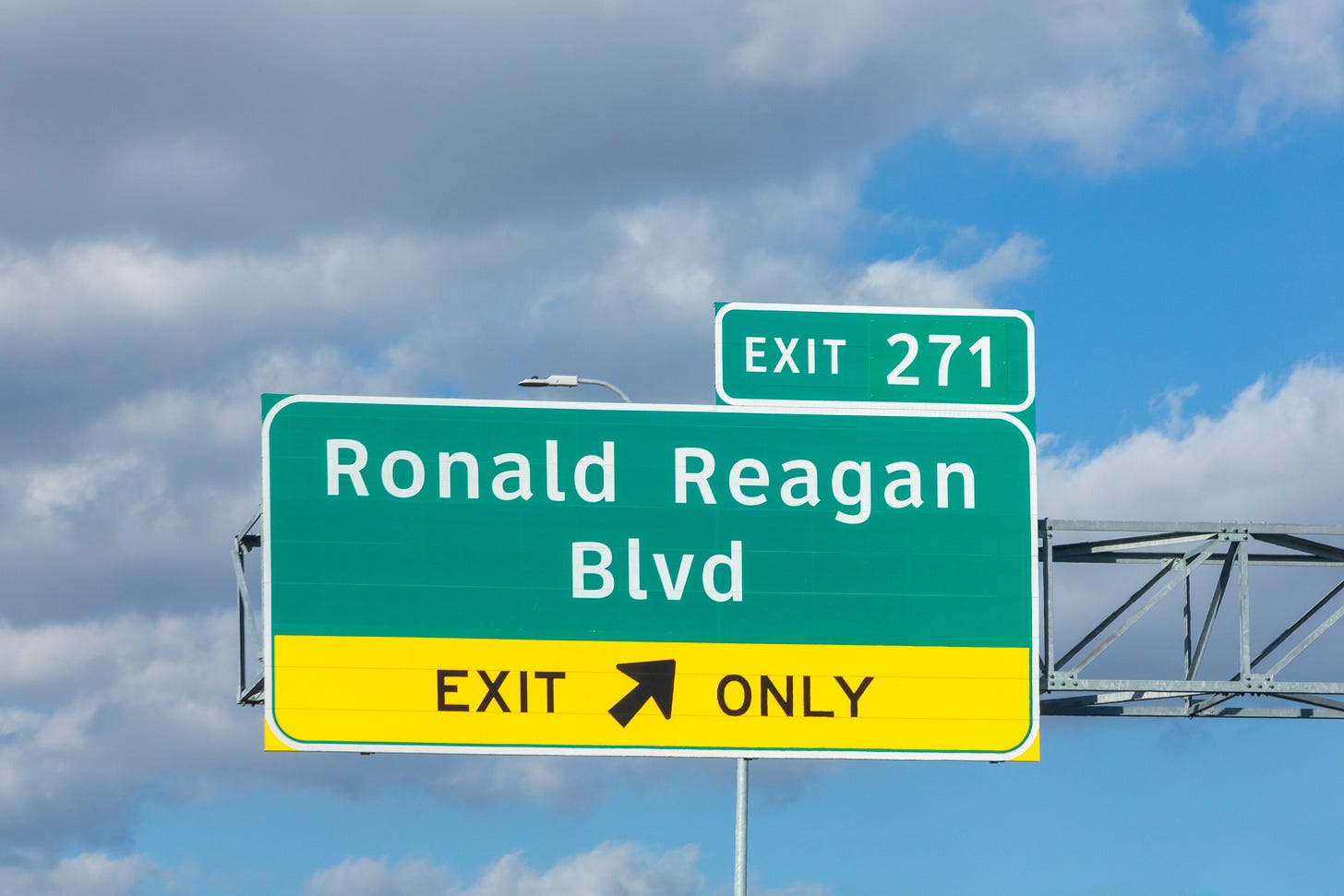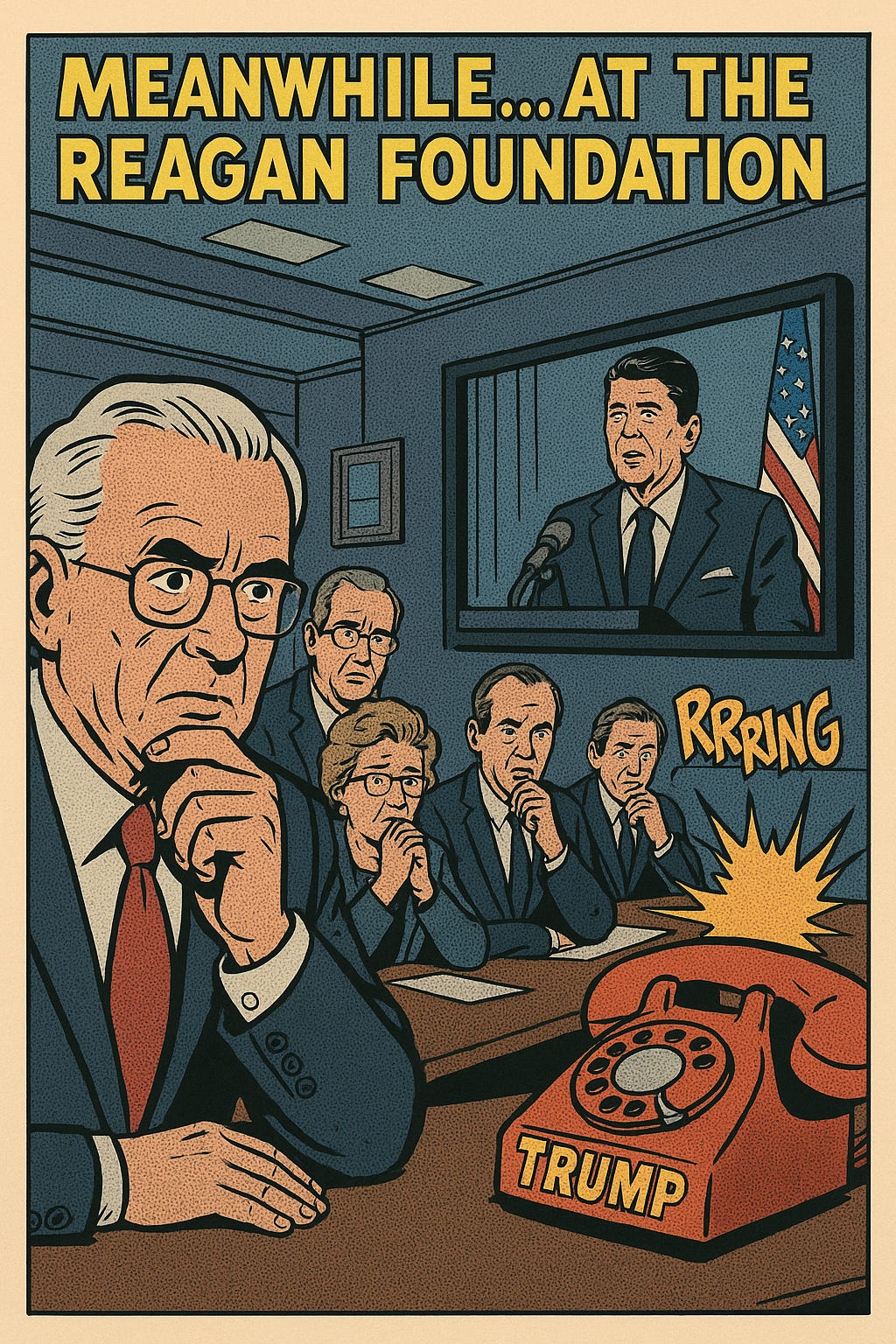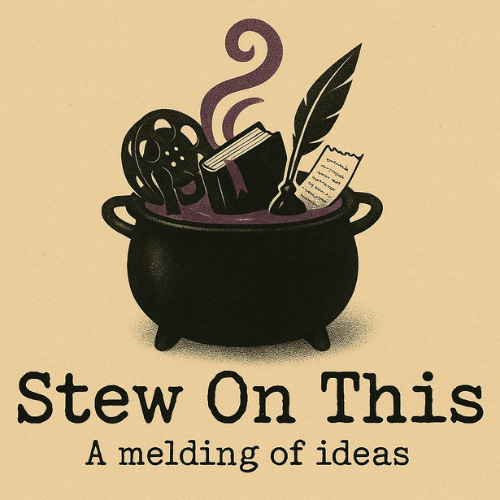The Ghost of Reagan Haunts the Future
Saint Reagan and the Shrinking Imagination of the Pro-Democracy Crowd

Still Mourning in America: Tariffs, Reagan, and the Fight That Misses the Point
There was a lot of consternation this past week over an ad the Ontario government ran during the American League Championship Series and Game One of the World Series. Yes, Canada’s largest province paid millions to air a minute-long ad aimed at Americans, because nothing screams “free trade diplomacy” like interrupting baseball to let Ronald Reagan dunk on tariffs from beyond the grave.
Ontario’s Premier Doug Ford (who governs like your uncle who bought gold during the Obama years) spearheaded the campaign, which used Reagan’s actual voice from a 1987 radio address: “High tariffs inevitably lead to retaliation by foreign countries and the triggering of fierce trade wars... Then the worst happens. Markets shrink and collapse; businesses and industry shut down, and millions of people lose their jobs.”
The point? A warning, as subtle as a sledgehammer, about protectionist economic policy and its impact on American workers.
Mark Carney, the current Canadian prime minister and a seasoned global finance figure, defended the ad, calling it an expression of Reagan’s authentic worldview. Trump and the Reagan Foundation, however, were not amused. Trump went full nuclear, torpedoing U.S.-Canada trade talks and accusing Canada of “interfering” with American democracy by buying airtime to broadcast Reagan’s ghost. The Reagan Foundation, normally the gray-haired guardian of the Gipper’s memory, broke precedent by siding with Trump and condemning the ad as “misleading.”
So here we are again: embroiled in a drama that, on its surface, feels like a very elite quarrel over a president long dead. But it’s worth digging into, because this isn’t just about an ad or a speech.
It’s about how a calcified idea of Reagan is holding the pro-democracy coalition back from having the one conversation that actually matters: what comes next.
The Conservative Family Feud: Trump vs. Reagan’s Ghost vs. Reagan’s Fan Club
Never Trump conservatives, those still clinging to the sinking life raft of Reaganite nostalgia, were quick to dismiss the Reagan Foundation’s alignment with Trump. They argued Reagan was a free trader, a happy warrior for markets and alliances. They painted Trump as a populist heretic, yelling at the clouds about Chinese steel and Canadian dairy while Reagan would’ve charmed them into a free-trade handshake over Scotch.
There’s even speculation that the Reagan Foundation caved to pressure. Maybe they wanted to avoid being backhanded online by the most volatile force in American politics. Maybe they’ve grown tired of defending a legacy that half the country misremembers and the other half no longer cares about.
Meanwhile, Trump, whose economic playbook is mostly just tariffs and vibes, insisted Reagan “LOVED TARIFFS.” In his telling, the Gipper was basically a proto-Trump, only with better diction and a sharper suit.
The funny part? Trump’s not entirely wrong.
Reagan: Free Trader in the Streets, Protectionist in the Sheets
The Reagan speech Ontario used came from April 1987. It was a national address warning Americans about the long-term damage of protectionist trade wars. But, and here’s the delicious irony, it was delivered literally days after Reagan imposed tariffs on Japanese semiconductors.
That’s right. Reagan was warning against the dangers of protectionism while actively practicing it, not unlike a doctor telling you to quit smoking with a Marlboro tucked behind their ear.
Reagan’s record is a study in contradiction. He signed the U.S.-Canada Free Trade Agreement and preached the gospel of market liberalization. But he also protected Harley-Davidson with a 45% import tariff, slapped duties on Japanese electronics, and pressured allies into “voluntary” export restraints to help American auto manufacturers.
So was he a free trader? Yes.
Was he also a situational protectionist? Also yes.
He was, in essence, a political pragmatist with a free-trade compass, but one who wasn’t afraid to grab the tariff lever when domestic industry cried uncle.
Why This Fight Feels So Tired and So Dangerous
Here’s why all this matters.
The Reagan fight, like so many other ideological skirmishes, is a proxy war that distracts from the real work. The Never Trump crowd still wants to draw a bold line between Reagan and Trump, between virtue and vice, optimism and grievance, globalism and nationalism.
But drawing that line requires ignoring the fact that Reagan’s economic ideas, especially when it came to free trade and the gutting of labor protections, laid the groundwork for the backlash Trump rode to power.
Trump’s populist protectionism didn’t appear in a vacuum. It was a direct response to the hollowing out of American industry, much of it accelerated by trade regimes born in the Reagan–Clinton era. Trump’s voters weren’t policy wonks. They were people whose towns had been bulldozed by the “free market” gospel that Reagan preached.
To them, tariffs aren’t heresy. They’re revenge.
So when centrists clutch their pearls over Reagan being lumped in with Trump, it feels like an argument about what kind of footnote to put on a tombstone. That battle is over. The voters moved on. The economy moved on. The world moved on. It’s time the “pro-democracy” movement did too.
Canada’s Troll Move, or, How to Poke the Bear with Reagan’s Own Voice
Let’s pause for a moment to appreciate Canada’s boldness here.
They didn’t just make a trade ad. They made a Reaganist weapon and fired it into the heart of American conservative identity.
That’s not just strategy. That’s performance art.
Was it cynical? Sure. But also effective. Because it exposed just how fragile the myth of Reagan has become, for instance, when a foreign government can quote your conservative idol accurately and cause your current conservative president to melt down, you don’t have a Reagan problem. You have an identity crisis.
The whole thing reads like political theater written by Adam McKay: a ghostly Reagan warns of tariff doom, a rage-tweeting Trump shuts down diplomacy, and the Reagan Foundation rushes in, not to defend Reagan’s words, but to police how they’re used. Curtain.
The Generation That’s Not Buying It
I’ve long argued it isn’t very ethical to separate Reagan and Trump like oil and water. The truth is more uncomfortable: Reagan was the prologue. Trump is the climax.
And yet, this battle over Reagan’s legacy has spilled into a Democratic Party still run by folks who are desperate to hold onto the dream of “Morning in America,” a dream that never really applied to anyone outside the Acela corridor or those not already seated at the table.
They still believe in a noble center, a centrist politics that can appeal to reason, civility, and economic abstraction. But that center is haunted by a nostalgia that prevents it from reckoning with the damage that era actually caused. Blind spots on race, labor, rural collapse, and elite consolidation were features, not bugs.
And those of us not baptized in the cable glamor of the late ’80s don’t need to carry that baggage.
We need a new center.
One not built on defending ghosts, but on building policies for real people. Policies that aren’t afraid to admit that maybe the consensus of the last 40 years failed more people than it helped. That perhaps the small-town ideal wasn’t destroyed by “identity politics,” but by bipartisan worship of deregulated trade and capital.
The Tariff Fight Is the Wrong Fight
Whether Reagan liked tariffs or not is academic.
The more urgent question is: what do we need now? Because the old economic consensus is broken. Because Trump’s populism, as cynical and dangerous as it is, spoke to a vacuum the center refused to acknowledge.
And if Reagan’s ghost is now being fought over like a holy relic in a fading church, maybe it’s time to close the sanctuary doors and start building something new on different ground.
Anyways, happy Monday.







You can draw a straight line from Reagan’s 11th commandment to Republicans enabling flagrant Trump criminality.
Never understood the fixation with Regan. His policies devastated Central America and laid the foundation for the migration crisis today. He started an arms race with the Soviets but put everything on credit, laying the foundation for the massive debt that will likely destroy the dollar within the next 5-10 years. He was not a good leader and America is still paying for his bad policies.